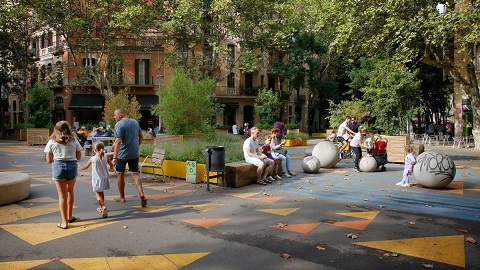Barcelona takes stock of the declaration of climate emergency advised by ICTA-UAB
ICTA-UAB researcher Gara Villalba was one of the speakers invited by Barcelona City Council at the event to take stock of the three years since the declaration of climate emergency in Barcelona. During the event, Gara Villalba, who is responsible for the ERC URBAG project, discussed the city's metabolism.

In January 2020, the city declared the climate emergency and pledged to take a number of short and long-term measures to become carbon neutral by 2050.
During the stocktaking event it was noted that, 3 years after the declaration of the climate emergency, 96% of the measures set out in the Climate Emergency Declaration have either been completed or are in progress. Thirty-one municipal measures have now been completed and 46 are under way. These include adding greenery and pedestrian space, promoting the use of bicycles and public transport, the rollout of climate shelters and renewable energy, cutting waste and reducing the waste of food and water.
The goal of the Climate Emergency Declaration signed in 2020 was to become carbon neutral by 2050 and adapt the city to become more resilient and able to tackle the challenges of climate change.
Greener and healthier urban model
- Rollout of the Barcelona Superblock model to foster community life and neighbourhood economies.
- Work is currently under way on the green streets in L’Eixample, which will add 58,000 square metres of space for pedestrians.
- Urban greenery has also been increased, with another 44.6 hectares through various projects completed in the last four years.
- The increase in green areas is aimed at generating new spaces offering shade and comfortable temperatures while fostering a more pleasant urban landscape. In this respect, the city has also rolled out its network of climate shelters, with 134 for the winter and nearly 200 for the summer.
Priority for sustainable mobility
- Work is in progress to increase and improve the city’s cycling infrastructure: an additional 30 kilometres of bike lanes have been created, bringing the total to 241.
Energy, waste and food
- The city has doubled the energy it produces with municipal solar panels and the power supplied by the metropolitan public operator Barcelona Energía,now equivalent to the consumption of 100,000 households.
- The door-to-door waste collection system in Sarrià and Sant Andreu has been consolidated.
- Local people also play their part in adapting the city to the climate crisis.
The UAB, with Sustainable Development Goals
Affordable and clean energy
Responsible consumption and production
Sustainable cities and communities
Partnerships for the goals
Climate action